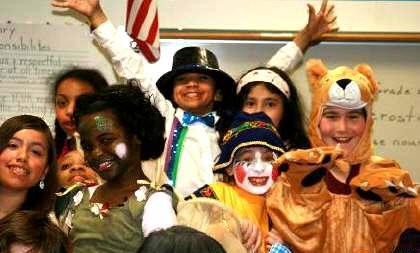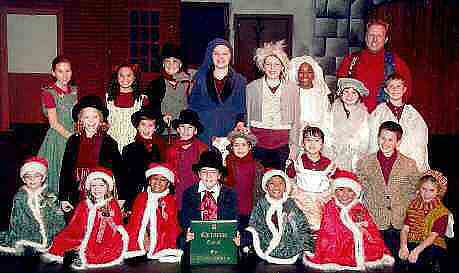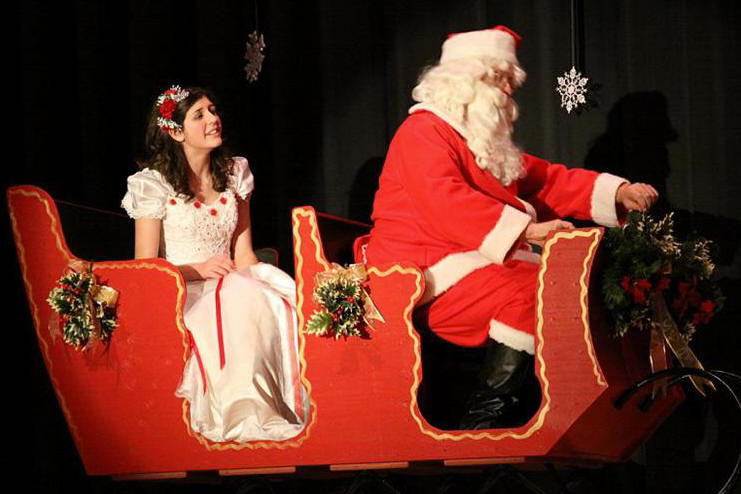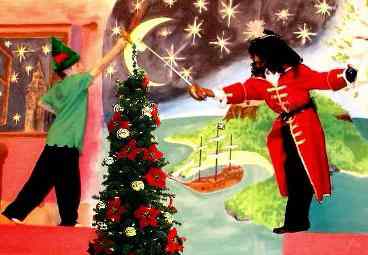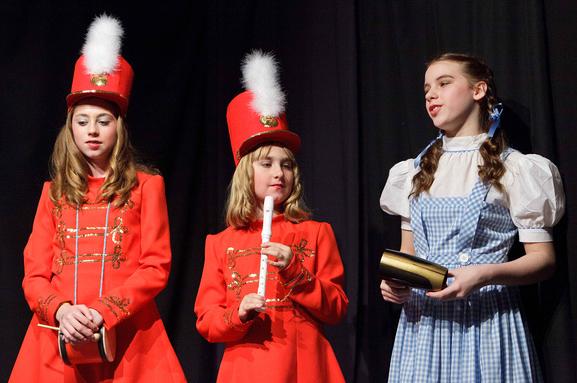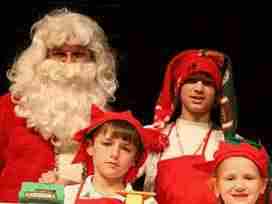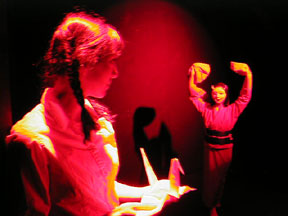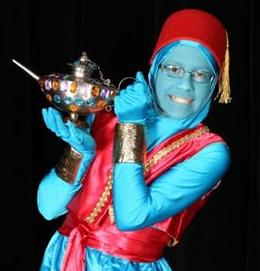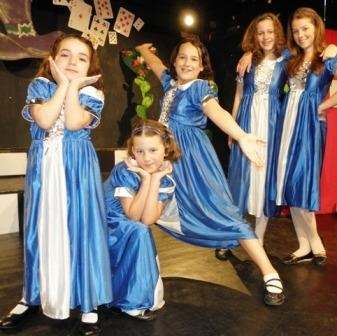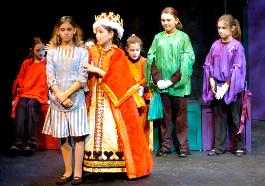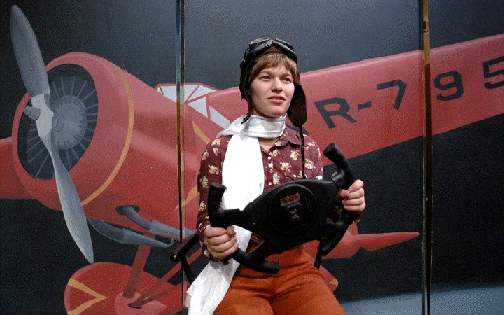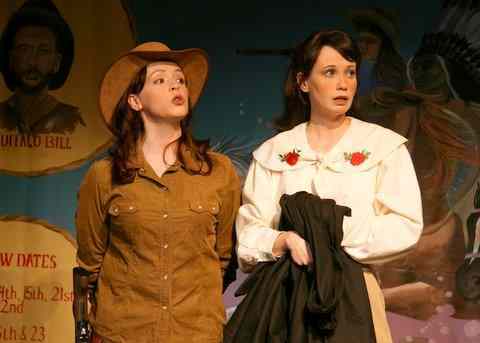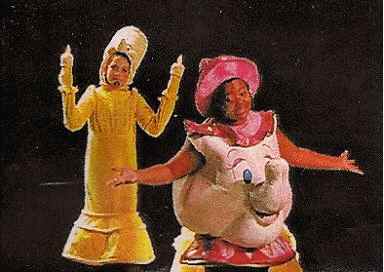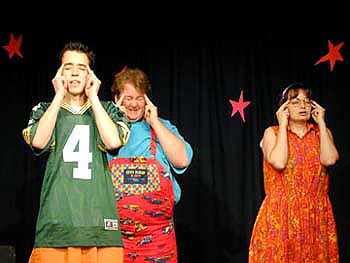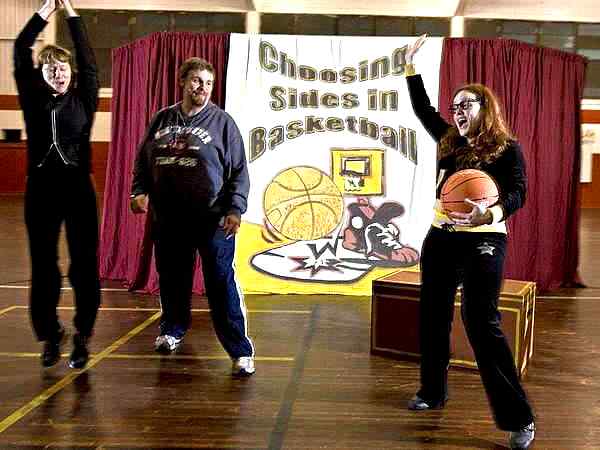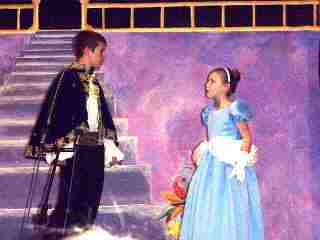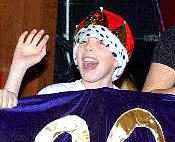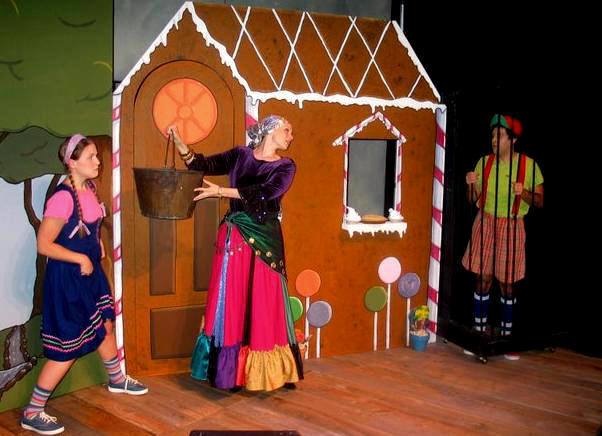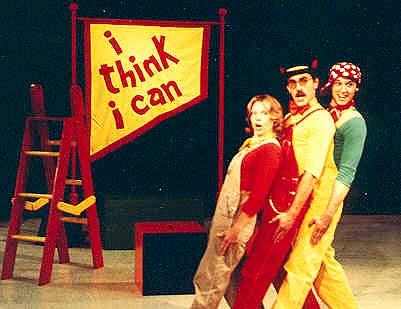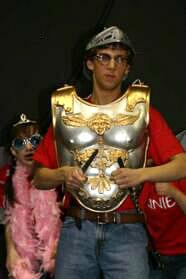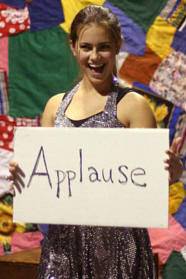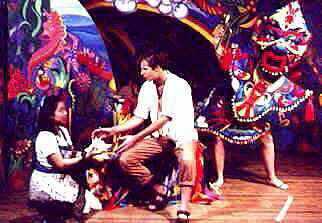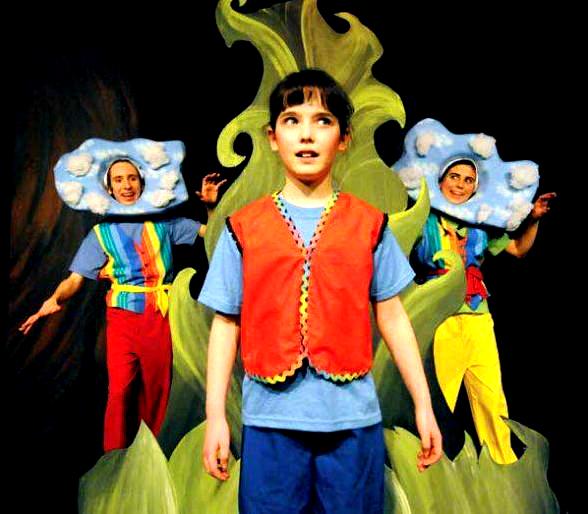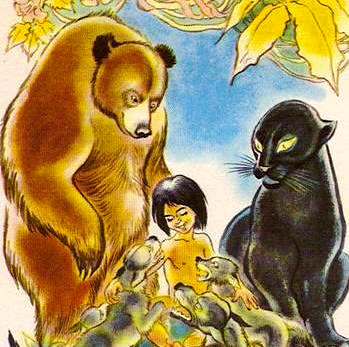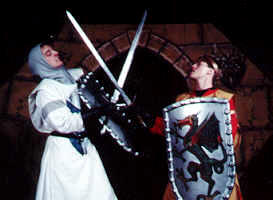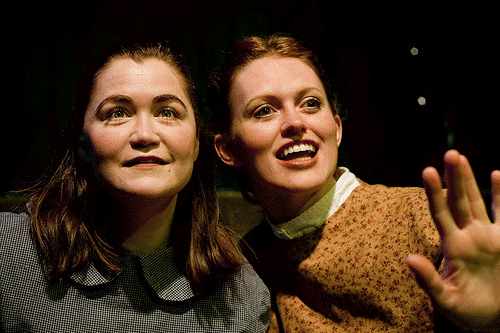|
.
 FREE
RESOURCES FREE
RESOURCES

Classroom
Activities [
Page 3 ]
Student
discussions, exercises, games before and after the play
<
Prev | 1
| 2 | 3
| 4
| 5
| 6
| 7
| 8
| Next > |
What
Lessons Does ‘Wizard of Oz’ Teach Us?
Classroom Discussions – Wizard
of Oz
General Discussion / Questions
1. Why does Dorothy want to be in some other
place than Kansas?
2. Do you ever feel like Dorothy did?
3. Dorothy is taken to Oz by a
"twister", what is another name for a twister?
4. Oz is a very beautiful and colorful world,
but Dorothy still finds problems there. Do you think there is any
place where there are no problems?
5. Do you think the Scarecrow really needed a
brain? The Tinman a heart? The Lion his courage?
6. The Wizard, at the end of the play, turns
out not to be a Wizard. Though he didn't have the magic powers of a
wizard, do you think he helped Dorothy, the Scarecrow, the Tinman,
and the Lion?
7. It is interesting that Dorothy had the power
to return home to Kansas anytime she wanted to but she wasn't aware
of it. Do you think we often have the power to do what we want but we
may not know it?
8. How many books have been written about the
Land of Oz? (hundreds) Have you heard of any others besides The
(Wonderful) Wizard of Oz?
Let Your Students
Roar With Fun!
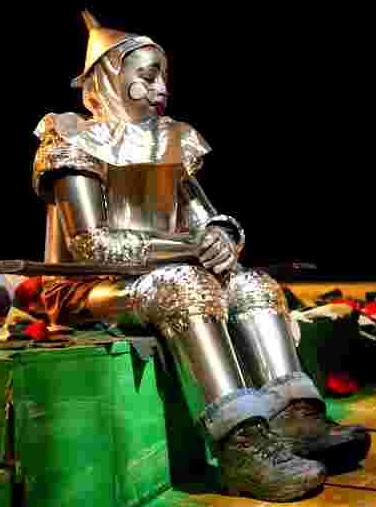 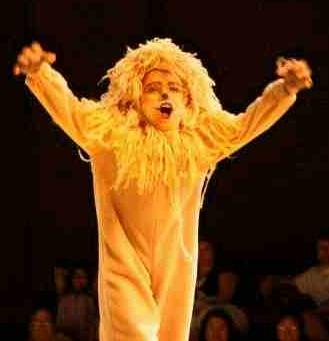 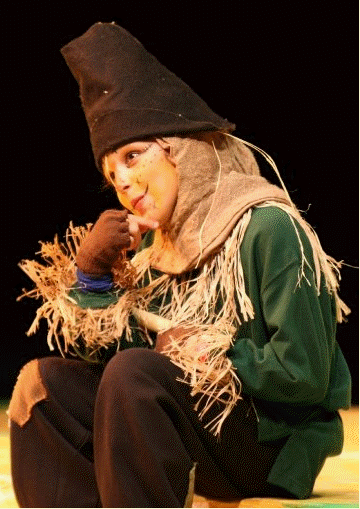
A Roaring Good Time
at Lakefront Youth Theatre Experience, New Orleans
Drawing & Art Activities
You saw the Wicked Witch' s castle, what do you
think Glinda's castle looks like?
Draw a picture of your favorite part of the
show; of your favorite character.
Draw a picture of yourself with characters in
the play. Where would you be? What would you be doing?
Famous Wizard of Oz Quotes
Discuss what meaning these sayings have for us
in our everyday lives. Can you give an example that illustrates the meaning?
"Never question the truth of what you
fail to understand, for the world is full of wonders." -- L.
Frank Baum
"..Remember, my friend, a heart is not
judged by how much you love, but by how much you are loved by others..."
– Wizard
"...if I ever go looking for my hearts
desire again, I won't look any further than my own backyard...
Because if it isn't there, I never really lost it to begin with.”
-- Dorothy
Lets Talk
about Courage!
The Cowardly
Lion in Wizard Of Oz is
Perfect for Discussion!
Discussion / Questions:
Have a class discussion about the Lion's search for courage. The
following questions could be addressed:
Why do you
think the Lion felt that he needed courage?
(Lions
are known as the King of the Jungle. The Lion felt that he did not
have enough courage to live up to the expectations of others)
Talk About
the Cowardly Lion in Wizard of Oz
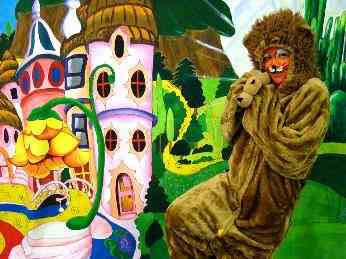 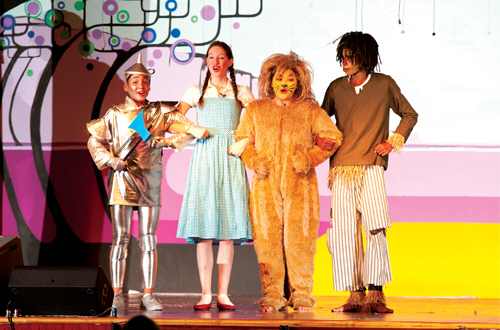
Karapiro School, Cambridge, NZ - British
School, Ho Chi Minh City, Vietnam
How
important is it to live up to the expectations of others, such as
parents, friends, and acquaintances? Do you feel that there are times
when you do not have enough courage? What do you do in these situations?
What would
you like to do? What is the best thing for you to do?
Was the
Wizard able to give the Lion courage at the end of the story?
(No, he
discovered that courage must come from within. As various challenging
situations arose on the journey, the Lion unconsciously responded
courageously because of his desire to help others)
Ask students
to reflect upon a time they exhibited courage when they thought that
they lacked it. Have students think about ways they can develop courage.
Writing Exercise:
Have students write a commercial or jingle that tells/shows the
audience: How to Cultivate the Courage that Lies Within Us. Some
ideas that can be incorporated are: Believe in yourself. Don't be
afraid to say no. Telling the truth is always the best policy. Don't
feel that you must follow the crowd in order to survive. It is more
important to think for yourself.
Martin
Luther King in the Classroom
Prepare for ‘We
are the Dream’ with Classroom Activities
Citizenship
/ Role Playing
This common
activity is used in classrooms everywhere – but it's one worth
repeating from time to time! The activity helps students understand
the concept of "discrimination."
For this
activity, divide the class into two or more groups. Some teachers
divide students by eye or hair color; some invite students to select
and wear badges of different colors (purple, green, and other colors
that are not related to skin color); and others isolate students
whose first names begin with the letter B (or whichever letter is the
most common first letter of students' names in the class).
For a class
period or for an entire school day, one group of students (for
example, the kids who have blond hair, those wearing orange badges,
names start with B, etc.) are favored above all others. Those
students receive special treats or special privileges, and they are
complimented often. Students who aren't in the "favored"
group, on the other hand, are ignored, left out of discussions, and
otherwise discriminated against.
At the
end of the period, students discuss their feelings.
• How
did it feel to be treated unfairly, to be discriminated against?
•
Invite students to talk about times they felt they were judged or
treated unfairly.
• How
does this experiment relate to the life of Martin Luther King?
Let Your
Kids Live the Dream!
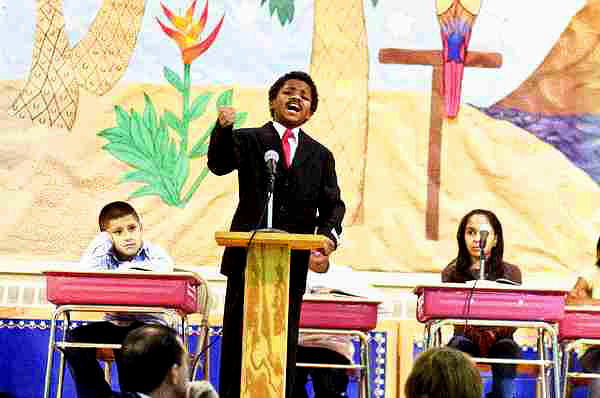
A Student Performs MLK's
Dream Speech!
Charteret School, Bloomfield, NJ
Read Aloud
Read aloud
one of many Martin Luther King, Jr. biographies to motivate interest
in creating a timeline of his life. Your school and local libraries
are sure to have several to choose from.
Select a
handful of the most important events from the book to start your
timeline. Let students fill in other events as they use other books
(and online resources) to learn more.
Teachers at
the lower grades might focus on books that emphasize a "getting
along" theme -- books such as The Land of Many Colors by the
Klamath County YMCA (Scholastic, 1993), Together by George Ella Lyon
(Orchard Paperbacks), and The Berenstain Bears and the New Neighbor
(about the bears' fears when a panda family moves in next door).
Geography
On a U.S.
map highlight places of importance in the life of Martin Luther King.
Place a pushpin at each location and extend a strand of yarn from the
pin to a card at the edge of the map. On the card explain the
importance of that place.
History /
Role Playing
Make a list
of events that are included on your Martin Luther King timeline
(e.g., Rosa Parks' bus ride, integrating Little Rock's schools, a
lunch counter protest, the "I have a dream” speech).
Let students
work in groups to write short plays in which each group acts out one
of the events.
Public Speaking
Martin
Luther King's "I have a dream" speech is one of the most
famous and often quoted speeches of all time.
• Read
the speech aloud.
•
Invite students to listen to the speech. ( Hear
the speech )
• Write
on a chart some of the "dreams" Martin Luther King
expressed in it.
• Ask
students to think about the things they dream for themselves, their
families, their country, and the world, and to express those dreams
in their own "I have a dream” essays.
Multiculturalism
A simple
class or school project can demonstrate the beauty of diversity!
Martin
Luther King's dream was to see people of all countries, races, and
religions living together in harmony. Gather seeds of different kinds
and invite each student to plant a variety of seeds in an egg carton.
The seeds of different shapes, sizes, and colors will sprout side by side.
Once the
plants are large enough, transplant them into a large pot in the
classroom or in a small garden outside. Each class in the school
might do the project on its own, culminating in the creation of a
beautiful and colorful (and diverse!) school-wide garden.
Classroom
Exercises: <
Prev | 1
| 2
| 3
| 4
| 5
| 6
| 7
| 8
| Next >
All
Free Resources
|
